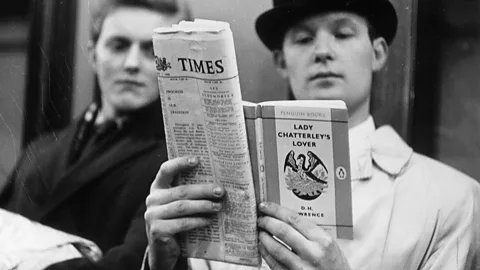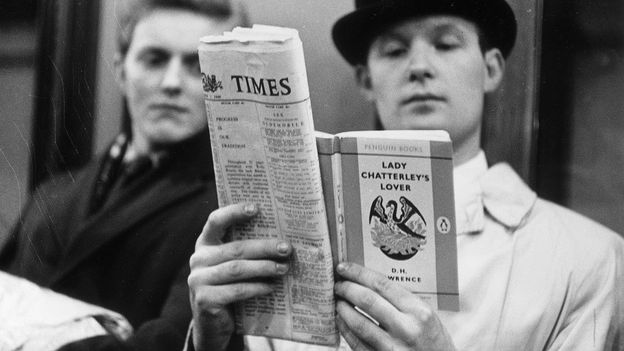 Getty Images
Getty ImagesThe UK publication of DH Lawrence’s novel, Lady Chatterley’s Lover, gripped the nation in 1960. In History looks at the highly publicised trial that led to its release – and the rush to see what all the fuss was about.
Until November 1960, British people were prevented from reading Lady Chatterley’s Lover by a law that criminalised the publication of writing considered indecent and immoral. The British publishing house, Penguin Books, wanted to challenge the Obscene Publications Act by printing a complete, uncensored edition of DH Lawrence’s book. The resulting trial symbolised social changes that had been bubbling under in the years since World War Two, and demonstrated the gulf between the public and those who saw themselves as the guardians of established morals.
Lady Chatterley’s Lover had been published privately in Italy and France in the late 1920s, but was banned thereafter in several countries around the world including the US, Australia and Japan. In the years leading up to the trial, writers and publishers in Britain had become increasingly worried by the number of books being prosecuted for obscenity. In an attempt to allay these fears, the UK’s Parliament introduced a new Obscene Publications Act in 1959 that promised “to provide for the protection of literature and to strengthen the law concerning pornography”. This amendment provided a defence for anyone accused of publishing a “dirty book”. It allowed them to argue that a piece of work should be published if it had literary merit, even if the average person found its material shocking.
Lady Chatterley’s Lover was considered controversial as it depicted a passionate relationship between an upper-class woman, Lady Constance Chatterley, and a working-class man, Oliver Mellors. The novel includes swear words and explicit descriptions of sex, and it portrays female sexual pleasure. Lawrence said that he hoped to reclaim sex as something that was acceptable in literature. He wanted to “make the sex relations [in the novel] valid and precious, instead of shameful”.
In 1960, Penguin was ready to test the Obscene Publications Act. They wrote to the director of public prosecutions (DPP) and warned that they would be publishing an original version of the book. In August that year, Reginald Manningham-Buller, the chief legal adviser to the Crown, read the first four chapters of the novel while travelling on a boat train to Southampton. He wrote to the DPP, approving legal proceedings against Penguin. “I hope you get a conviction,” he said. Sir Allen Lane, the founder of Penguin Books, was in Spain as events unfolded. His colleagues advised him to return home immediately.
The trial of Lady Chatterley’s Lover was the first of its kind under the new Act, and the scene was set for a clash between the establishment and those with more liberal views. To support their case in favour of publishing the novel, Penguin summoned a host of expert witnesses including 35 prominent writers and politicians. Among the group was Richard Hoggart, an influential academic and author who was seen as a key witness. He argued that the novel was an essentially moral and “puritan” work, which merely included words that he had heard on a building site on his way to the court.
In opposition, Mervyn Griffith-Jones led the prosecution, which argued that the sex in the novel was gratuitous pornography. “When you have seen the book just ask yourselves, would you approve of your sons and daughters reading it?” Griffith-Jones asked the jury. “Would you leave it lying about your house? Is it a book you would even wish your wives and servants to read?” He also listed nearly 100 uses of swear words in its pages. Mr Justice Byrne, the judge who presided over the trial, pointed out that the low price of the book meant it would “be available for all and sundry to read”. These statements are often cited as representing the out-of-touch attitudes of the British establishment at the time. On 2 November 1960, after a six-day trial, the jury took three hours to deliberate and came to a unanimous decision. Penguin Books was found “not guilty” under the Act.
Lady Chatterley’s Lover went on sale immediately afterwards, as Penguin had prepared to distribute it in the event of acquittal. They had to work with a new printing firm as their usual one refused to touch it. But the trial had the effect of promoting the book, which sold out of all 200,000 copies on its first day of publication. It went on to sell three million copies in three months.
A few days after it went on sale, a shop owner in England, Mr Donati, spoke to BBC News about the novel’s immediate popularity. “We ordered 1,000 to start with,” he said. “We had every hope of getting them, of course, but in the event, it was cut to half. We received 500 copies. We were open quite early, at five to nine, and I should imagine we’ve sold 50 or 60 [copies] already… I think we should have to wait at least three weeks [for another stock].”
Still, traditional English reserve hadn’t vanished overnight. Many customers were too embarrassed to ask for the scandalous novel by name, one bookseller told the BBC. “Some of them just ask for Lady C, some of them just give you three and six [three shilling and sixpence].” As the reporter noted, “It’s rather different from selling an ordinary book.” But then, Lady Chatterley’s Lover was no ordinary book. When published in full, it would become a symbol of freedom of expression, and a sign that Britain’s cultural landscape was changing. The poet Philip Larkin captured its significance in his poem, Annus Mirabilis:
“Sexual intercourse began
In nineteen sixty-three
(which was rather late for me) –
Between the end of the Chatterley ban
And the Beatles’ first LP.”
For more stories and never-before-published radio scripts to your inbox, sign up to the In History newsletter, while The Essential List delivers a handpicked selection of features and insights twice a week.

